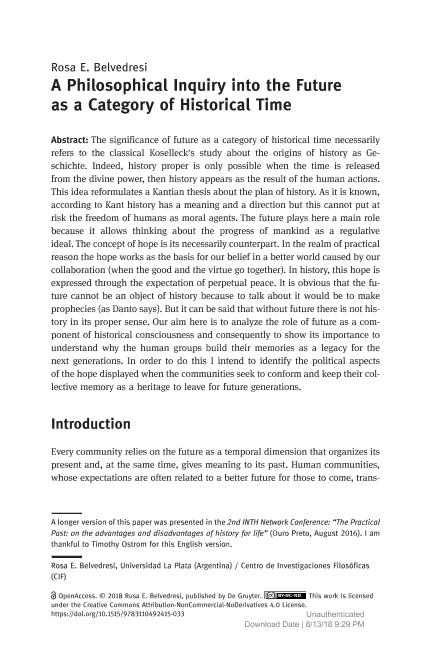Mostrar el registro sencillo del ítem
dc.contributor.author
Belvedresi, Rosa Elena

dc.contributor.other
Roldan Panadero, Concha

dc.contributor.other
Brauer, Oscar Daniel

dc.contributor.other
Rohbeck, Johannes
dc.date.available
2023-03-28T00:18:50Z
dc.date.issued
2018
dc.identifier.citation
Belvedresi, Rosa Elena; A philosophical inquiry into the future as a category of historical time; De Gruyter; 2018; 449-462
dc.identifier.isbn
978-3-11-049241-5
dc.identifier.uri
http://hdl.handle.net/11336/191750
dc.description.abstract
The significance of future as a category of historical time necessarily refers to the classical Koselleck′s study about the origins of history as Geschichte. Indeed, history proper is only possible when the time is released from the divine power, then history appears as the result of the human actions. This idea reformulates a Kantian thesis about the plan of history. As it is known, according to Kant history has a meaning and a direction but this cannot put at risk the freedom of humans as moral agents. The future plays here a main role because it allows thinking about the progress of mankind as a regulative ideal. The concept of hope is its necessarily counterpart. In the realm of practical reason the hope works as the basis for our belief in a better world caused by our collaboration (when the good and the virtue go together). In history, this hope is expressed through the expectation of perpetual peace. It is obvious that the future cannot be an object of history because to talk about it would be to make prophecies (as Danto says). But it can be said that without future there is not history in its proper sense. Our aim here is to analyze the role of future as a component of historical consciousness and consequently to show its importance to understand why the human groups build their memories as a legacy for the next generations. In order to do this I intend to identify the political aspects of the hope displayed when the communities seek to conform and keep their collective memory as a heritage to leave for future generations.
dc.format
application/pdf
dc.language.iso
eng
dc.publisher
De Gruyter

dc.rights
info:eu-repo/semantics/openAccess
dc.rights.uri
https://creativecommons.org/licenses/by-nc-nd/2.5/ar/
dc.subject
TIME
dc.subject
HISTORY
dc.subject
HERITAGE
dc.subject
FUTURE
dc.subject.classification
Otras Filosofía, Étnica y Religión

dc.subject.classification
Filosofía, Ética y Religión

dc.subject.classification
HUMANIDADES

dc.title
A philosophical inquiry into the future as a category of historical time
dc.type
info:eu-repo/semantics/publishedVersion
dc.type
info:eu-repo/semantics/bookPart
dc.type
info:ar-repo/semantics/parte de libro
dc.date.updated
2023-02-15T21:15:39Z
dc.journal.pagination
449-462
dc.journal.pais
Alemania

dc.journal.ciudad
Berlin
dc.description.fil
Fil: Belvedresi, Rosa Elena. Consejo Nacional de Investigaciones Científicas y Técnicas. Centro Científico Tecnológico Conicet - La Plata. Instituto de Investigaciones en Humanidades y Ciencias Sociales. Universidad Nacional de La Plata. Facultad de Humanidades y Ciencias de la Educación. Instituto de Investigaciones en Humanidades y Ciencias Sociales; Argentina
dc.relation.alternativeid
info:eu-repo/semantics/altIdentifier/url/https://www.degruyter.com/document/doi/10.1515/9783110492415/html
dc.relation.alternativeid
info:eu-repo/semantics/altIdentifier/doi/https://doi.org/10.1515/9783110492415
dc.conicet.paginas
464
dc.source.titulo
Philosophy of Globalization
Archivos asociados
